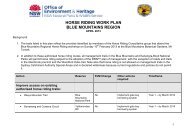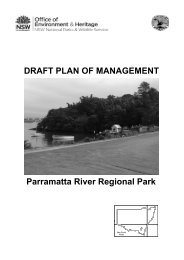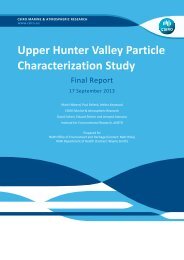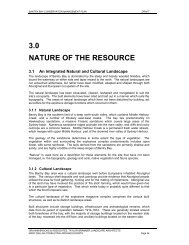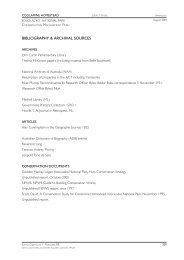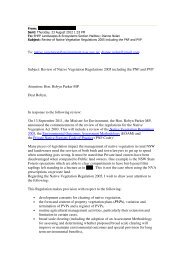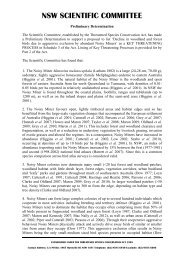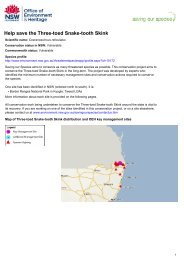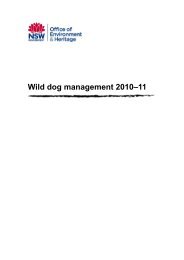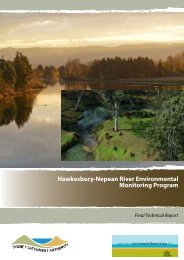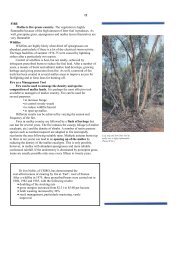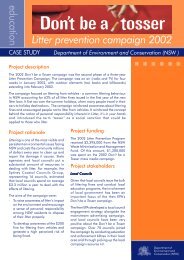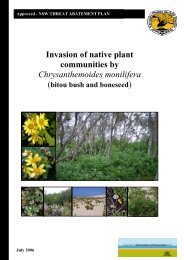Progress Report 2007-2008 - Department of Environment and ...
Progress Report 2007-2008 - Department of Environment and ...
Progress Report 2007-2008 - Department of Environment and ...
You also want an ePaper? Increase the reach of your titles
YUMPU automatically turns print PDFs into web optimized ePapers that Google loves.
114<br />
Due date Region FA section Milestone <strong>Progress</strong><br />
ABORIGINAL INTERESTS<br />
Aboriginal involvement in forest management<br />
2000 1 April<br />
UNE,<br />
LNE,<br />
Eden<br />
5.1.3<br />
SFNSW <strong>and</strong> NPWS each to prepare a strategy to<br />
ensure Aboriginal communities <strong>and</strong> stakeholders are<br />
given a greater participatory role in forest<br />
management.<br />
In progress<br />
DECC is developing a policy for Aboriginal partnerships in park management, which is expected to be complete in 2009. With other<br />
initiatives, such as DECC’s Aboriginal Community Engagement Framework (completed in <strong>2007</strong>), the policy will form DECC’s strategy<br />
for providing Aboriginal communities <strong>and</strong> stakeholders a greater participatory role in park management.<br />
Despite this, Aboriginal communities are already involved in park management. Existing joint management arrangements are a case<br />
in point. Also draft reserve plans <strong>of</strong> management are generally referred to relevant Aboriginal organisations <strong>and</strong> National Parks plans<br />
<strong>of</strong> management are generally referred to relevant Aboriginal organisations <strong>and</strong> National Parks <strong>and</strong> Wildlife Regional Advisory<br />
Committees, which include Aboriginal representatives, for comment. DECC also continues to consult with Aboriginal communities on<br />
the preparation <strong>of</strong> threatened species, recovery plans (a statutory requirement <strong>of</strong> the Threatened Species Act 1995) <strong>and</strong> to help<br />
recover other species where there is a known cultural association. In some instances major development proposals are referred to<br />
Aboriginal organisations for comment.<br />
Further reporting on Aboriginal involvement in reserve <strong>and</strong> cultural heritage management can be found in DECC’s annual reports<br />
available at: www.environment.nsw.gov.au/whoweare/reports.htm<br />
Further information on Aboriginal communities’ involvement in threatened species recovery plans <strong>and</strong> management is available at:<br />
www.threatenedspecies.environment.nsw.gov.au/tspr<strong>of</strong>ile/pas_recovery_strategies.aspx (under ‘Aboriginal liaison <strong>and</strong>/or<br />
interpretation’).<br />
The Bega <strong>and</strong> Eurobodalla Aboriginal heritage studies are continuing. These studies are overseen by two steering committees,<br />
comprised mostly <strong>of</strong> Aboriginal people.<br />
The UNE, LNE, Eden <strong>and</strong> Southern ESFM plans include policy statements that commit Forests NSW to ensuring Aboriginal<br />
communities are involved in managing State forests, <strong>and</strong> corporate ‘Operational Guidelines for Management <strong>of</strong> Aboriginal Cultural<br />
Heritage on State forests’, which include consultative arrangements that Forests NSW regions will use to engage with local Aboriginal<br />
communities for forest activities, when communication with the community could be expected, site protection <strong>and</strong> a review <strong>of</strong> how well<br />
these consultative arrangements worked over the previous period. The guidelines were developed in consultation with NPWS <strong>and</strong> the<br />
NSW Heritage Office <strong>and</strong> draw on the Protective Mechanisms for Cultural Heritage report prepared on behalf <strong>of</strong> the Cultural Heritage<br />
Working Group, as part <strong>of</strong> the NSW Comprehensive Regional Assessments.<br />
To achieve this, Forests NSW makes a commitment with Aboriginal people to ensure:<br />
appropriate Aboriginal Cultural Heritage Awareness training for Forests NSW staff<br />
involvement in any further development <strong>of</strong> policy concerning the management <strong>of</strong> Aboriginal values <strong>and</strong> interests in State forests<br />
identification <strong>and</strong> management <strong>of</strong> Aboriginal cultural heritage sites, places <strong>and</strong> resources<br />
access to l<strong>and</strong> for cultural purposes which may include hunting <strong>and</strong> gathering<br />
identification <strong>of</strong> culturally appropriate co-management <strong>and</strong> commercial joint venture opportunities, <strong>and</strong><br />
identification <strong>of</strong> Aboriginal employment opportunities in cultural <strong>and</strong> natural resource management activities.<br />
NSW FOREST AGREEMENTS AND INTEGRATED FORESTRY OPERATIONS APPROVALS



